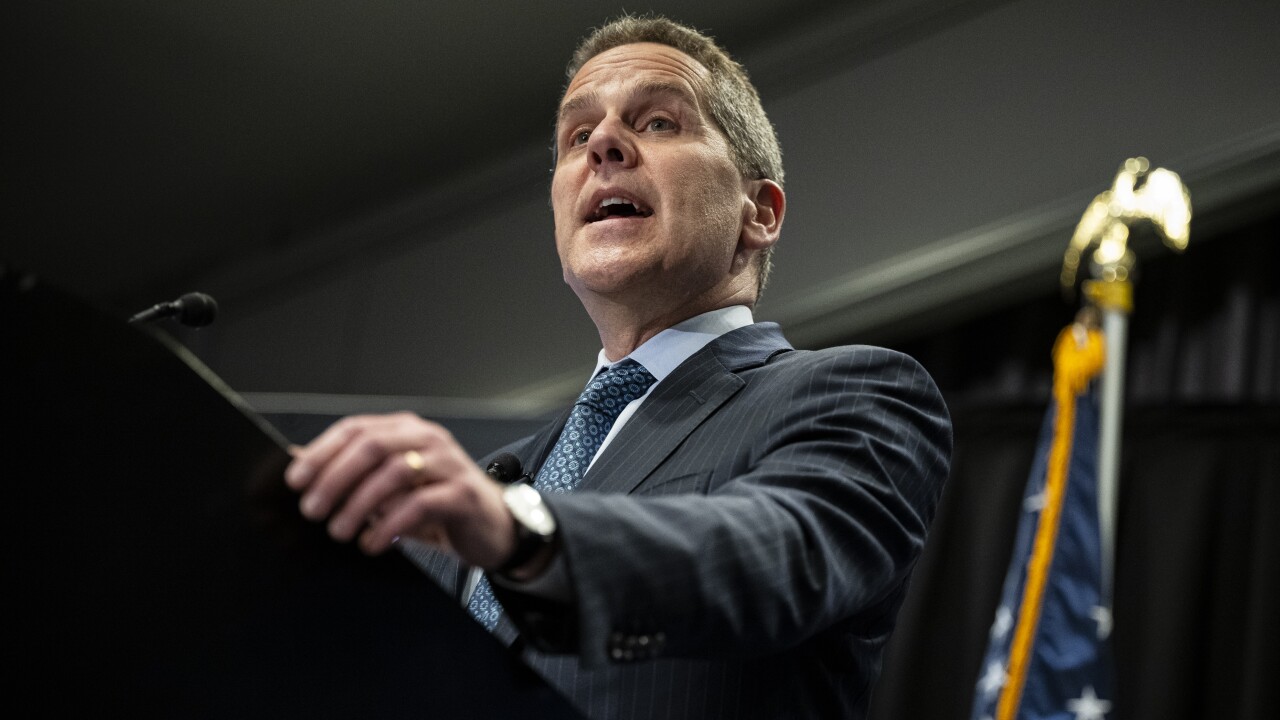-
Timothy Massad, the Treasury Department official responsible for overseeing the U.S. rescue of banks and automakers after the credit crisis, will be nominated to head the country's top derivatives regulator.
November 12 -
The distinguished economist will have to make monetary policy a priority during her tenure as Fed chair. But Yellen wont forget about her financial regulatory role and is likely to support stricter capital requirements along with enhanced nonbank supervision.
October 9
Perhaps it is three decades spent studying and working in the former Soviet Union that makes me very nervous about people who enable developing a cult of personality.
Now that Gary Gensler is leaving, pundits are panicking about the Commodity Futures Trading Commission's ability to function or, even, the future of financial derivatives reform in the U.S. They seem to forget the numerous CFTC professionals who toil in obscurity in Chicago, New York, Washington and Kansas City. I have had the opportunity to see how hard they work. Their dedication exists in spite of lack of Congressional support, criticism from the media or low remuneration. Most are there because they believe they can make a difference supervising the exchange-traded derivatives markets. They also now hope to bring transparency to the much larger over-the-counter part of the market.
Eyes have now turned to
The official statement from the White House states that he has experience in financial derivatives. His financial experience, however, appears to be concentrated in the legal aspects of corporate finance, such as bond underwriting, sovereign issuance and mergers and acquisitions. It is difficult to extract whether any of this experience entailed exchange-traded or over-the-counter derivatives. No doubt some conscientious Congressional staffer will do her research and encourage her boss to ask more details at Massad's confirmation hearing.
Amusingly, many of the people questioning Massad's knowledge about derivatives would be hard pressed to explain what one is, not to mention price or value one. Remember, Gensler was not a derivatives expert or a financial regulator. In fact, he strongly argued against regulating OTC derivatives in the 1990s. His intellectual capacity, leadership skills and, maybe, a bit of guilt helped him lead the CFTC from obscurity to the main regulatory agency in the rule-writing and implementation of Dodd-Frank's derivatives reform.
On a personal note, most of what I know about financial derivatives stems from my stint in banking, pounding less than exhilarating derivatives textbooks, and two decades of daily, hands-on consulting assignments with the people who work in the middle and back offices of derivatives groups. People without a derivatives background can learn about the nuances of these financial contracts. I have trained numerous CFTC professionals, and am happy to report they are quick to pick up how exchange-traded and OTC derivatives work.
Massad brings other skills sets and experience that could serve him well as CFTC chair. The CFTC focuses on rule-writing, interpreting laws and bringing enforcement actions. Massad's law degree and a quarter century in law practice certainly prepared him for that critical component of his prospective role. As a legal adviser to a Congressional panel that oversaw the Troubled Asset Relief Program, he certainly had an opportunity to see how weak risk management of derivatives and other portfolios can be in the U.S.'s largest internationally, interconnected banks.
Even before law school, his chosen concentration of Social Studies, where he was awarded magna cum laude, demonstrates not only his intellectual capacity, but his ability to multitask and to find interconnections in different subject areas. Social Studies is a concentration at Harvard that you have to apply to study. It is a very demanding, multidisciplinary concentration and requires students to be able to take courses in a variety of fields. At the CFTC, he will have to draw upon that skill set to oversee rule-writing, implementation, supervision and enforcement, while simultaneously playing politics with a dysfunctional Congress and improving the morale at the CFTC.
Importantly, Massad's international background will serve him well. Gensler had most of his professional experience in the U.S. Massad will come to the CFTC at a time that cross-border regulation is one of the greatest challenges not just in the derivatives markets, but in financial reform as a whole.
Massad worked in Cravath, Swaine & Moore's Hong Kong division for four years starting in 1998. He also worked in the London office, and when he worked in New York, he focused on Latin America. In 2007, he headed the India practice. He's also had some experience with Chinese financial transactions. These are regions with different cultures and legal systems. They are also at different stages of securities and derivatives development and regulation. With any luck, Massad will lead the CFTC to work more closely with the Federal Reserve and Federal Deposit Insurance Corp. which are certainly at the U.S. epicenter of cross-border regulatory challenges with Dodd-Frank's Title I and II.
Massad has the tools to tackle a long list of job duties. If he has any questions about derivatives which are unlikely to pose his biggest challenge I would humbly take his call.
Mayra Rodríguez Valladares is managing principal at





